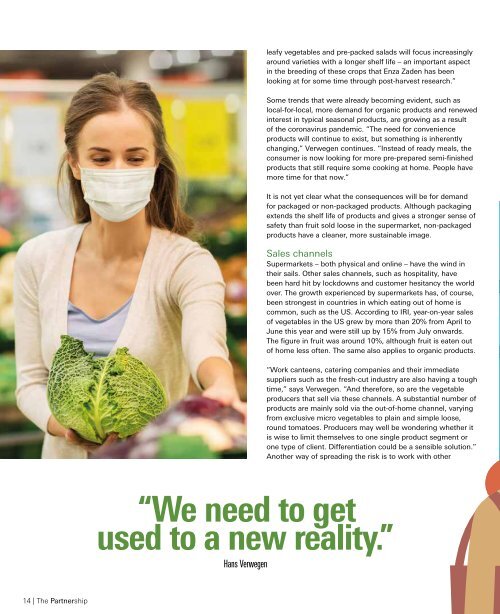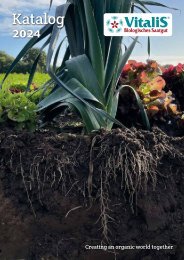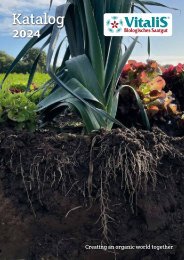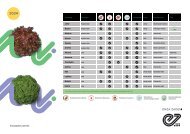The Partnership no. 18
- No tags were found...
You also want an ePaper? Increase the reach of your titles
YUMPU automatically turns print PDFs into web optimized ePapers that Google loves.
Trends<br />
leafy vegetables and pre-packed salads will focus increasingly<br />
around varieties with a longer shelf life – an important aspect<br />
in the breeding of these crops that Enza Zaden has been<br />
looking at for some time through post-harvest research.”<br />
Some trends that were already becoming evident, such as<br />
local-for-local, more demand for organic products and renewed<br />
interest in typical seasonal products, are growing as a result<br />
of the coronavirus pandemic. “<strong>The</strong> need for convenience<br />
products will continue to exist, but something is inherently<br />
changing,” Verwegen continues. “Instead of ready meals, the<br />
consumer is <strong>no</strong>w looking for more pre-prepared semi-finished<br />
products that still require some cooking at home. People have<br />
more time for that <strong>no</strong>w.”<br />
It is <strong>no</strong>t yet clear what the consequences will be for demand<br />
for packaged or <strong>no</strong>n-packaged products. Although packaging<br />
extends the shelf life of products and gives a stronger sense of<br />
safety than fruit sold loose in the supermarket, <strong>no</strong>n-packaged<br />
products have a cleaner, more sustainable image.<br />
Sales channels<br />
Supermarkets – both physical and online – have the wind in<br />
their sails. Other sales channels, such as hospitality, have<br />
been hard hit by lockdowns and customer hesitancy the world<br />
over. <strong>The</strong> growth experienced by supermarkets has, of course,<br />
been strongest in countries in which eating out of home is<br />
common, such as the US. According to IRI, year-on-year sales<br />
of vegetables in the US grew by more than 20% from April to<br />
June this year and were still up by 15% from July onwards.<br />
<strong>The</strong> figure in fruit was around 10%, although fruit is eaten out<br />
of home less often. <strong>The</strong> same also applies to organic products.<br />
“Work canteens, catering companies and their immediate<br />
suppliers such as the fresh-cut industry are also having a tough<br />
time,” says Verwegen. “And therefore, so are the vegetable<br />
producers that sell via these channels. A substantial number of<br />
products are mainly sold via the out-of-home channel, varying<br />
from exclusive micro vegetables to plain and simple loose,<br />
round tomatoes. Producers may well be wondering whether it<br />
is wise to limit themselves to one single product segment or<br />
one type of client. Differentiation could be a sensible solution.”<br />
A<strong>no</strong>ther way of spreading the risk is to work with other<br />
producers in cooperatives or growers’ associations. Specialists<br />
working together can then continue to provide specific market<br />
segments and customers with a bespoke service and take steps<br />
together when circumstances cause a segment to drop out for a<br />
short or long period of time.<br />
Supply chain<br />
A link has thus been forged to the supply chain for our production<br />
column. How has the coronavirus impacted on this? <strong>The</strong> market<br />
analyst: “What the coronavirus has made clear is that long,<br />
cross-border supply chains are particularly vulnerable. Where<br />
do you get products from if flights are grounded and sea or road<br />
transport suddenly takes a lot longer because of restrictions<br />
What are you seeing?<br />
<strong>The</strong> precise consequences for individual regions and countries<br />
will of course differ, but in general terms new trends are already<br />
appearing on a global scale. Below, some colleagues answer the<br />
question as to what developments they are seeing in the areas in<br />
which they work.<br />
Young Han, Area Manager Korea & Japan - “COVID-19 made<br />
some changes in our society and in fresh market trends. <strong>The</strong><br />
most important change is the boost in online shopping, because<br />
people are avoiding crowded areas. <strong>The</strong> fresh vegetable market<br />
appears to be in good shape and the demand for leafy products<br />
is even growing. People are looking for more healthy food.<br />
<strong>The</strong> main issue in production areas is labour shortage. Korea<br />
and Japan depend on a South Asian work force and travel<br />
restrictions because of the Covid-19 situation prove to be a real<br />
bottle neck.”<br />
and additional formalities? How do you ensure you have e<strong>no</strong>ugh<br />
people at harvest time if freedom of movement is restricted<br />
or more people are off sick? Or when migrant workers can <strong>no</strong><br />
longer cross borders? It is crystal clear that mechanisation and<br />
robotisation can provide a substantial boost in this area.” We take<br />
a closer look at this in the Tech<strong>no</strong>logy article in this magazine.<br />
In addition, more attention will have to be paid to ways of<br />
shortening supply chains. This benefits the local-for-local trend.<br />
And it will also play a role in the further development and growth<br />
of PFALs (plant factories with artificial light) in and around large<br />
population centres.<br />
Heverton Teixeira, Commercial Manager, Brazil - “Covid-19<br />
is a promotor of changes in the vegetable and fruit chain.<br />
An example are the groceries Hortifruti Natural da Terra and<br />
Oba Hortifruti, which responded to the consumer’s change<br />
in shopping behaviour by instantly launching online ordering<br />
applications and expanded services. We also <strong>no</strong>tice a growing and<br />
much broader demand for healthy fresh fruits and vegetables that<br />
were formerly out of reach for the poorer part of our population.<br />
Prudencio Olivares, Regional Sales Director, Spain - “When<br />
disruptions occur, opportunities appear. We just have to<br />
anticipate, identify and grab them, like good breeders have<br />
been doing for decades. I am optimistic because of the growing<br />
demand for fresh, healthy vegetables. Especially amongst<br />
the younger generations. <strong>The</strong>y are also open minded towards<br />
in<strong>no</strong>vations like <strong>no</strong>n-traditional products and web shops.<br />
“We need to get<br />
used to a new reality.”<br />
Hans Verwegen<br />
14 | <strong>The</strong> <strong>Partnership</strong><br />
<strong>The</strong> <strong>Partnership</strong> | 15

















